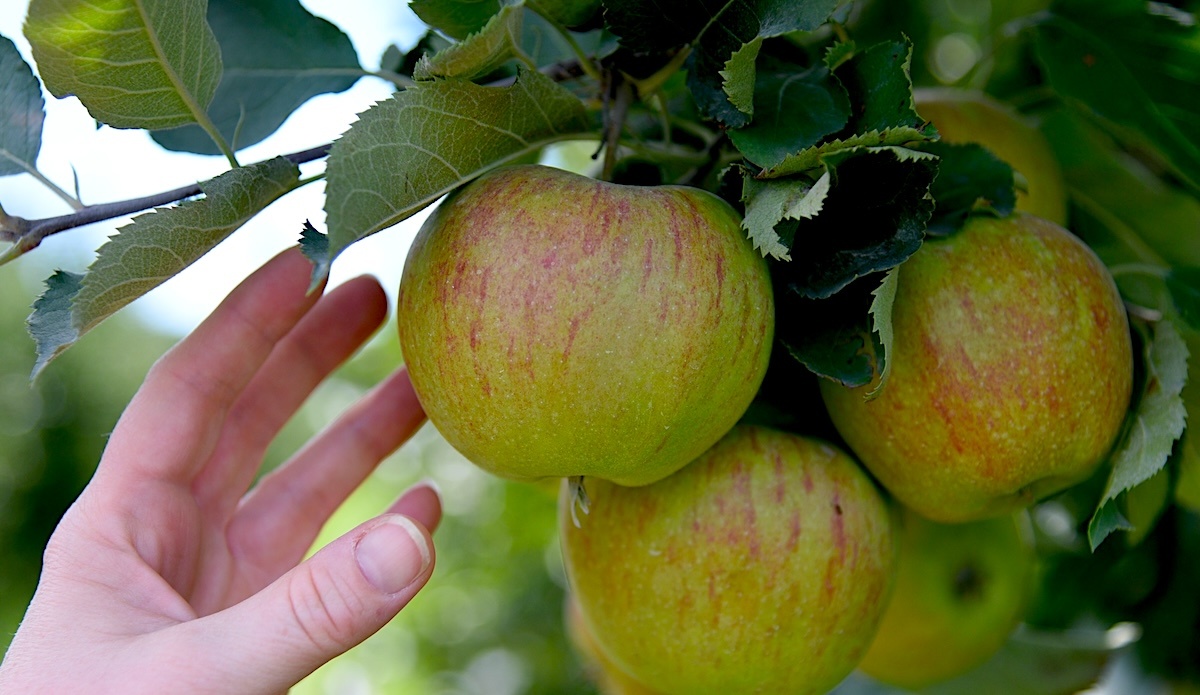
How ’Bout Them Apples? Michigan Apple Harvest Is Looking Bountiful
Local growers react to the 2025 crop
By Todd VanSickle | Sept. 20, 2025
For the fourth consecutive year, Michigan is on track for an above average apple harvest thanks to mild weather conditions, low disease outbreak, and more high-density orchards.
Michigan farmers are estimated to harvest a combined 30 million bushels or about 1.26 billion pounds of apples this year. The announcement was made on Aug. 15 during the USApple Outlook meeting held in Chicago.
“As growers continue to plant high-density orchards and adopt other innovative growing practices, Michigan’s apple crop sizes will increase, and we will continue to see these larger crops,” said Diane Smith, executive director of the Michigan Apple Committee. “Michigan Apple growers are proud to produce the largest and most valuable fruit crop in our state.”
Last year, the state harvested 30.5 million bushels. All told, there are more than 17.6 million apple trees in commercial production and 850 family-run farms in Michigan, according to the Michigan Apple Committee.
In the next few weeks, northern Michigan apple growers will be busy harvesting this year’s bounty, while leaf peepers and apple pluckers flock to the area for the annual fall pilgrimage.
“Apples are the largest and most valuable fruit crop in Michigan, not to mention a big part of Michigan’s culture,” said Smith. “Ask any Michigander about their fall traditions, and you’ll hear about apple picking, apple cider, and more. Apples are the flavor of fall in Michigan, naturally.”
Altonen Orchards
South of Elk Rapids sits Altonen Orchards off US-31. Its roadside farm stand stays busy this time of year as shoppers zip in and out with fresh produce and pecks of apples in hand.
The Altonens have been farming the area for more than 70 years, and the farm encompasses more than 330 acres over three locations: Williamsburg, Kewadin, and Eastport. Having multiple growing locations has benefited the Altonens when it comes to inclement weather.
“At various times we lose fruit to a late frost or something,” says co-owner and general manager Kristie Altonen. “So it helps that we have three farms. We’ve spread ourselves out along US-31, so if one farm gets a frost or gets hail, then chances are the other one didn’t.”
Earlier in the growing season, several other farms were affected by hail, but Altonen said they had little damage. She says the farm has been fortunate this year with no major issues of disease, either, like fire blight, a bacterial disease spread through insects, rain, and wind.
“Our apple crop is way better than our cherry crop,” Altonen said. “It is shaping up to be a good year.”
Behind the market on top of a small hill sits Townline Ciderworks and tasting room. Next to the building is an orchard that was planted in 2015 when a windstorm wiped out a block of apple trees. The orchard was replanted with apples specifically used for making hard cider.
It was that year that the family started brainstorming ways to use a large-volume cider press that was being underused after pressing and selling fresh cider for more than 30 years.
“There was a nationwide E. coli outbreak in fresh cider, and we were no longer able to wholesale it,” Altonen says. “We used to wholesale it all over northern Michigan. And then the restrictions changed, and you had to pasteurize to be able to wholesale it. We chose not to, because people believe that it changes the flavor.”
The Altonens continued to sell fresh cider at their roadside stands, but turned their efforts toward hard cider, too. Townline Ciderworks officially opened its doors in 2015, and today, the company has a full line of hard ciders that don the likeness of family members on their respective cans.
Despite the wide array of beverages, Altonen only uses about 5 to 10 percent of the apple harvest in the production of hard cider. She estimates they press about 15,000 gallons per year. As for what’s being pressed? Townline has been making cider for the past nine summers, and each season customers’ tastes change.
“Customers are gravitating more to a drier cider this summer,” Altonen says. “We’re getting more requests for lower residual sugar ciders. So you can ferment like bone dry. And people always like anything that we do that we ferment with whole fruit.”
Aside from cider, Altonen’s apples are used for a variety of products and are sold to several businesses big and small to be used in products like GoGo Squeez and sold at McDonalds.
“We sell way more of our fresh apples,” Altonen explains, adding that their most popular apple is the Honeycrisp. “They’re hard to beat as far as eating wise.”
For families with young children, she suggests Galas because of their sweetness and iconic apple appearance. However, her favorite is the Ginger Gold, which is one of the earliest apples to be harvested in September.
“Their flesh is not too hard,” Altonen says of the Ginger Gold. “They are just smooth tasting, sweet, and tart. They’re really hard to beat. I think they are one of the better apples in our area.”
VerSnyder Orchards
Kevin VerSnyder has an eight-acre orchard just south of Lake Leelanau. He farms mostly high-density apple trees, with an acre of peaches, some plums, and apricots. He lives just a few miles away from his farm, which is on his parents’ property, where he planted his first apple tree in 1999. VerSnyder notes that most of his apples are perfect for fresh consumption, and although he does not offer u-pick apples at his orchard, it is something he would like to “dabble” with more in the future.
The VerSnyder Orchard produces about 240,000 pounds of apples each year. The farmer says he sells his apples locally at various farm markets, grocery stores and cider makers. However, his biggest buyers are packing houses down state.
“We also got a roadside stand outside our farm that’s really popular,” VerSnyder adds.
His most popular varieties are Honeycrisp, Evercrisp, and Ludacrisp. He describes the Evercrisp as a cross between a Honeycrisp and Fuji.
“You get that really nice crunch of the honey crisp, and the flavor and sweetness of the Fuji,” VerSnyder says. “They keep forever, hence their name Evercrisp. I sell them all winter long at the indoor farmers market at The Commons. I think I sold out in May or June. Just an amazing apple.”
The Ludacrisp is an open pollinated Honeycrisp, VerSnyder explains. “It has a lot of tropical flavors, kind of like Juicy Fruit gum, or pineapple,” he tells us.
For the most part, the weather hasn’t been too much of an issue for the farmer, with the exception of a few cold spring mornings that reduced the crop for a few varieties.
“We definitely got hit a little bit with some cold,” VerSnyder says. “Evercrisp was a little light compared to what it usually is.”
He adds that heat was also an issue during the thinning stage, which is where excess fruit is removed to improve size and quality.
“The thinning window was difficult because it got really hot,” VerSnyder says. “We had upper 90s for thinning, so we had to cut our rates back. I know some of us growers over-thinned certain varieties a little bit because of the heat.”
Overall, he believes it has been a good apple growing season and he plans to plant more high-density apples in the future.
“I think we’re on pace to have one of our best years yet,” VerSnyder concludes. “Costs are up and products aren’t cheap, but people were here this summer, for sure. I think the demand is definitely up again this year.”
Trending

Winter Break at the Library
Trying to keep the kids busy while school is out? Head to the library! Dec. 22, take your 12+ tweens and teens to the Mesick… Read More >>
Umbo Is Coming...to The Little Fleet
Winter isn’t just coming—it’s already here. But if you want a break from the December blues, head to The L… Read More >>
GTB Starting the Year with Tradition
The Grand Traverse Band of Ottawa and Chippewa Indians hosts the Kchi Wiikwedong Anishinaabek Maawnjidowin Round Dance on Ja… Read More >>


